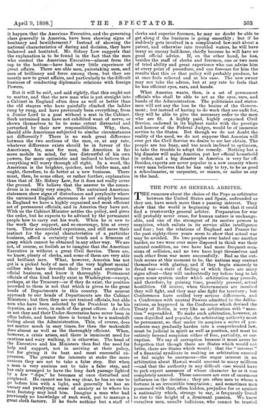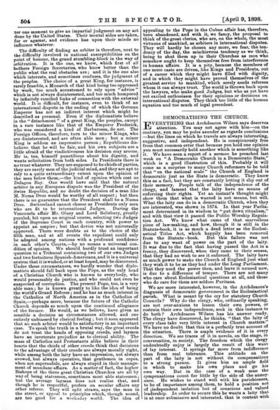THE POPE AS GENERAL ARBITER: T HE rumours about the choice
of the Pope as arbitrator between the United States and Spain, unfounded as they are, have much more than a passing interest. They show that the world is beginning to wish that it could find a trustworthy general arbiter. Preparation for war will probably never cease, for human nature is unchange- able, and one of the strongest of its motive powers is suspicion, which enlists in its service alike intelligence and. fear ; but the relations of England and France for the past eighty-three years seem to show that actual war may be avoided. No two peoples ever hated one another harder, no two were ever more disposed to think war their natural condition, no two have had more frequent occa- sions of collision, and no two have kept themselves and each other from war more successfully. Bad as the out- look seems at this moment to be, the nations may content themselves with glaring, and if they begin sincerely to dread. war—a state of feeling of which there are many signs afloat—they will undoubtedly try before long to hit upon some system under which arbitration may precede, and therefore, by gaining time, possibly prevent, actual hostilities. Of course, when Governments are insulted they will fight, and they may also fight for territory ; but Conferences have settled very serious differences, and a Conference with neutral Powers admitted to the delibe- rations, as happened in the Conference which devised the Treaty of Berlin, is very like an arbitration with " sanc- tion " superadded. To make such arbitration, however, at once dignified and popular, the arbitrating authority must be permanent, so that under its auspices a series of pre- cedents may gradually harden into a comprehended law, must be judicial in spirit as well as position, and must be entirely beyond suspicion either of fear, partiality, or cor- ruption. We say of corruption because it must never be forgotten that though there are States which would not bribe, there are States which would ; that the " interest " of a financial syndicate in making an arbitration succeed or fail might be enormous—the sugar interest in an arbitration about Hawaii would amount to many millions —and that the authority in any difficult case would have to pick expert assessors of whose character he or it was completely assured. Those assessors are sure of enormous influence on the decision ; they are often men to whom a fortune is an irresistible temptation ; and sometimes men possessed with that often hidden, prejudice for or against a nationality which, strange to say, is frequently found to rise to the height of a dominant passion. We know ourselves men. usually judicious, who cannot be trusted tor one moment to give an impartial judgment on any act done by the United States. Their mental sides are taken, for or against, and evidence has upon their minds no influence whatever.
The difficulty of finding an arbiter is therefore, next to the difficulty involved in national susceptibilities on the point of honour, the grand stumbling-block in the way of arbitration. It is the one, we know, which first of all bothers Foreign Secretaries, who know better than the public what the real obstacles are ; and it is the one also which interests, and sometimes confuses, the judgment of the peoples. The choice of a great King, for instance, is rarely feasible, a Monarch of that kind being too oppressed by work, too much accustomed to rely upon " advice " which is not always disinterested, and too much hampered by infinitely ramified links of connection with the external world. It is difficult, for instance, even to think of an international dispute in the ending of which the German Emperor has not an indirect interest which might be described as personal. Even if the diplomatists believe in the " detachment " of a great King, the peoples, except in a rare instance like that of the Emperor Frederick, who was considered a kind of Barbarossa, do not. The Foreign Offices, therefore, turn to the minor Kings, who are disinterested, and are often able men ; but a minor King is seldom an impressive person ; Republicans dis- believe that he will be fair, and his own subjects are a little afraid of the vindictiveness his decision may arouse. He is, too, himself punctilious about his dignity, and wants solicitation from both sides. In Presidents there is no trust whatever. They are supposed to be chiefs of parties, they are rarely men of the judicial mind, and they are apt to rely to a quite extraordinary extent upon the opinion of the men below them,—the kind of opinion which cost us Delagoa Bay. One would have said that the natural arbiter in any European dispute was the President of the Swiss Republic, and no doubt the decision of a man like M. Numa Droz would be worthy of all respect ; but then there is no guarantee that the President shall be a Numa Droz. Switzerland cannot choose as Presidents only men who are fit to be international Judges. During the Venezuela affair Mr. Olney and Lord Salisbury, greatly puzzled, hit upon an original course, selecting two Judges of the Supreme Court in each country, with power to appoint an umpire ; but that device was not universally approved. There were doubts as to the choice of the fifth man, and at all events the expedient could only be adopted among nations with a profound confidence in each other's Courts,—by no means a universal con- dition of opinion. We should hardly trust an important question to a Tribunal containing two of our own Judges and two fortuitous Spanish-Americans, and it is a universal system that it is wished, or at least hoped, may be discovered.
Under these circumstances, we hardly wonder that diplo- matists should fall back upon the Pope, as the only head of a Christian Church who is known to everybody, who would presumably do justice, and who could not even be suspected of corruption. The present Pope, too, is a very able man ; he is known greatly to like the idea of being the world's Grand Referee ; and he has as much interest in the Catholics of North America as in the Catholics of Spain,—perhaps more, because the future of the Catholic Church depends so much upon the continued allegiance of the former. He would, as we believe, have given as sensible a decision as circumstances allowed, and one entirely unbiassed by clerical feeling ; but it soon appeared that no such arbiter would be satisfactory in an important case. To speak the truth in a brutal way, the great creeds do not trust the heads of opposing creeds, and laymen have an inveterate prejudice as to clerical ability. The mass of Catholics and Protestants alike believe in their hearts that the chiefs of other creeds think that decisions to the advantage of their creeds are always morally right, while among both the laity have an impression, not always avowed, but always operative, that gentlemen in copes, when not supersubtle, are always stupid in their manage- ment of mundane affairs. As a matter of fact, the higher Bishops of the three great Christian Churches are all by way of being statesmen, sometimes most able statesmen ; but the average layman does not realise that, and though he is respectful, prefers on secular affairs any other referee. They will split straws, says the man in the street, or appeal to principles which, though sound, are too good for a workaday world. The idea of appealing to the Pope in the Cuban affair has, therefore, been abandoned, and with it, we fancy, the proposal to think of the great clerics, who are, on the whole, the most virtuous of mankind, as arbiters in international disputes. They will hardly be chosen any more, we fear, the ten- dency of the day, the mischievous tendency as we think, being to shut them up in their Churches as men who somehow ought to keep themselves free from interference in human affairs. It is a pity, because the members of one more caste are driven, like Kings and Presidents, out of a career which they might have filled with dignity, and in which they might have proved themselves of the greatest service to mankind, which sorely needs referees whom it can always trust. The world is thrown back upon the lawyers, who make good Judges, but who as yet have not excited enthusiasm for their opinions or decisions on international disputes. They think too little of the human equation and too much of legal precedent.



































 Previous page
Previous page